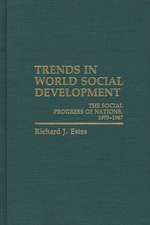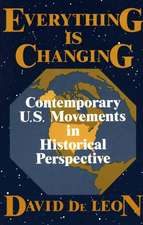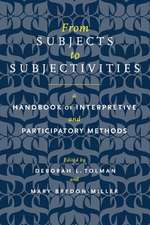Voices of Change: Participatory Research in the United States and Canada
Autor Mary Brydon-Miller, Budd Hall, Ted Jackson, Peter Parken Limba Engleză Hardback – 12 iul 1993 – vârsta până la 17 ani
Preț: 460.51 lei
Preț vechi: 637.28 lei
-28% Nou
Puncte Express: 691
Preț estimativ în valută:
88.12€ • 92.24$ • 73.34£
88.12€ • 92.24$ • 73.34£
Carte tipărită la comandă
Livrare economică 31 martie-14 aprilie
Preluare comenzi: 021 569.72.76
Specificații
ISBN-13: 9780897893343
ISBN-10: 0897893344
Pagini: 224
Dimensiuni: 156 x 235 x 22 mm
Greutate: 0.44 kg
Editura: Bloomsbury Publishing
Colecția Praeger
Locul publicării:New York, United States
ISBN-10: 0897893344
Pagini: 224
Dimensiuni: 156 x 235 x 22 mm
Greutate: 0.44 kg
Editura: Bloomsbury Publishing
Colecția Praeger
Locul publicării:New York, United States
Notă biografică
PETER PARK is Professor of Sociology at the University of Massachusetts, Amherst. He is the board president of the Center for Community Education and Action, an organization devoted to participatory research. He also is on the faculty of the Fielding Institute.MARY BRYDON-MILLER is Associate Professor of Educational Foundations, and Graduate Program Coordinator of Urban Educational Leadership in the College of Education, Criminal Justice, and Human Services at the University of Cincinnati.BUDD HALL teaches participatory research and adult education at the Ontario Institute for Studies in Education. He is the former Secretary-General of the International Participatory Research Network. His ideas on participatory research were developed first during his years as head of the Research Department of the Institute of Adult Education in Tanzania. His work over the years has dealt with how the ideas of those experiencing oppression can legitimate their knowledge and make it accessible to others in similar situations.TED JACKSON is adjunct research professor in the School of Public Administration at Carleton University in Ottawa, Canada, where he teaches development administration. A former staff member of the Participatory Research Group and the International Council for Adult Education in Toronto, he has taught participatory research and community economic development at Trent and Carleton universitiesand has served as an advisor to the Assembly of First Nations, the Canadian International Development Agency, the Canadian Labour Congress, the Dene Nation, and the Economic Council of Canada.
Cuprins
Foreword by Paulo FreireIntroduction by Budd HallWhat is Participatory Research? A Theoretical and Methodological Perspective by Peter ParkThe Powerful, the Powerless, and the Experts: Knowledge Struggles in an Information Age by John GaventaIf You Can't Beat 'Em, Join 'Em: The Professionalization of Participatory Research by Thomas W. HeaneyA Way of Working: Participatory Research and the Aboriginal Movement in Canada by Ted JacksonPutting Scientists in Their Place: Participatory Research in Environmental and Occupational Health by Juliet MerrifieldThe Appalachian Land Ownership Study: Research and Citizen Action in Appalachia by Billy D. HortonParticipatory Research as Critical Theory: The North Bonneville, USA Experience by Donald E. Comstock and Russell FoxBreaking Down Barriers: Accessibility Self-Advocacy in the Disabled Community by Mary Brydon-MillerAboriginal Organizations in Canada: Integrating Participatory Research by Marlene Brant CastellanoChallenges, Contradictions, and Celebrations: Attempting Participatory Research as a Doctoral Student by Patricia MaguireAppendix: Contact OrganizationsBibliographyIndex























